Recently, the "robberies" in China's second and third-tier cities have become more and more intense:
Before "Hohhot college students half-price purchase", followed by "Ningbo high-level talent 8 million yuan home grant", in succession for the retention of talent to do everything possible.
But the well-established policy could not prevent many people from jumping northward to Guangzhou, or even abroad.
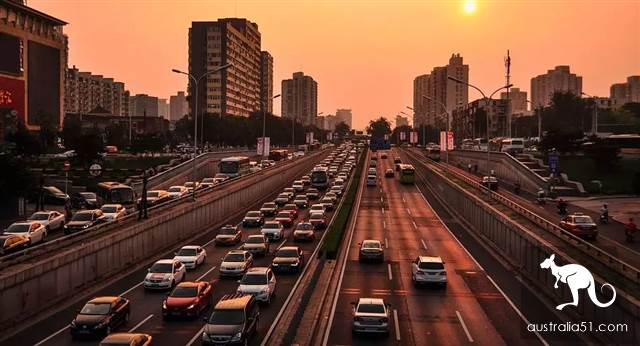
Haze Beijing, still can't stop a lot of Beijing drifters's heart
Australia has been one of the most popular destinations for immigrants. In fact, according to the latest Australian Bureau of Statistics, there are 1.2 million Chinese-Americans in Australia, and more "Chinese gathering area" in the capital cities such as Sydney and Melbourne.
Before that, Australian Finance had reported on the workplace ceilings that many Chinese would encounter in Australia. They have to stay abroad even if they work part-time … and how many Chinese compromise to their careers for the Australian dream.
In recent years, with the accelerated development of China's economic society, China has gradually become an input country for immigrants from other countries, from pure "immigration-exporting countries" at that time. Guangzhou, in particular, is known as "small Africa" because of the legal and illegal population of African descent.
These African nationals who have poured into China in recent years are often concerned and controversial by the media and the general public at home and abroad.
"when you're looking at the view on the bridge, the visionary is upstairs looking at you."
In Australia, what are the Australian people looking at?
What do Chinese people think of Africans in China?
This is a two-city story belonging to two alien groups.
1. "Hsiang Yin is hard to change": nearly 90% of East Asian immigrants have been discriminated against in Australia
In fact, in China, English education has been recognized and valued by both the official and the folk in recent years.
From "Bilingual Kindergarten" to "College English without graduation Certificate", from Li Yang "Crazy English" who has beaten chicken blood to become "China partner" representative of the New Orient … Remember that Beijing bid for the Olympic Games, but also once set off the peak of the people to learn English.
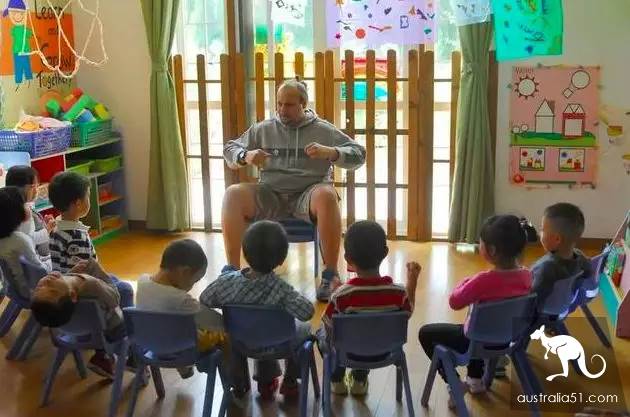
In the context of the establishment of many bilingual kindergartens, teachers' qualifications have become doubtful / source: Sohu (photo and text irrelevant)
But speaking English is one thing, "IELTS four 8" is one thing again, and being able to really communicate with foreigners in English is another level.
For many of the first generation of Chinese immigrants, the language barrier in the non-native language is always the wall of the "I can't see it.".
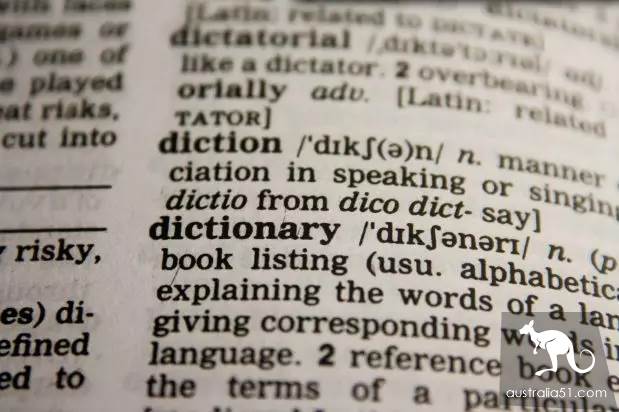
A study published last November by Domain, the Australian website real estate, found that if you or your parents were born overseas and spoke non-English at home, then compared with other Australians, You may have experienced more racist discrimination.
The site conducted an online survey of 6001 Australians across the country to measure the extent of their attitudes to racism and their personal experiences, as well as changes over time.
Asian-born respondents were twice as likely to experience racism in their lives as other Australians.
Eighty-four percent of these Asian-Australians have experienced racism; even 88 percent of respondents whose mother tongue is in the languages of East Asian countries (including Chinese).
Funny and sad to say, being in this "immigrant country"-in fact, even Australians who speak English in their native languages are nothing more than "outsiders" compared to the aborigines. But you can, of course, discriminate against other immigrants.
In fact, racial discrimination occurs in many places and situations, including residential areas, schools, workplaces, shopping malls and the Internet.

Sometimes it may be a swearing mouth on a certain remote street; sometimes it will appear in the election slogan of some political parties.
For example, the United Australia Party and the one-country Party have publicly published the words "protect Australia's future" and "resist threat from China" (click read more on "thought deadly"? New Zealand! "the first Holocaust in the Internet Age."
Sometimes racial discrimination even happens because you have a Chinese name.
A six-year Chinese student in Australia, Muki (alias), told Australian Finance and Economics that when she was studying at a university in Sydney, she had encountered a group assignment for a course that required a free team of at least three students in the online student system. But when she had just joined a group on the system, all the people in the group disbanded when they saw her Chinese name.
"I had to be alone in the end," she said. "she was still a little upset about what happened many years ago," the teacher said. It was a group assignment, and even if one person had done it, it would have to be Fail. "
Wood told the lecturer the reason, but was told that the result could not change, after all, "can not force others to form a team."
In fact, not all Australians "smell the color" of immigrants.
Recently, a paper entitled "Migration, population growth and voters: who cares and why?" (Immigration, population growth and voters: who cares, and why?) According to the report, the watershed between immigration and demographics is not divided between the rich and the poor, but is directly linked to education and world views.
Among them, the higher education Australian elite, than the low-educated people are more welcome to emigrate.

Australia's elite (college graduates and above) and the non-elite (uneducated) are increasingly divided on immigration issues, according to the study. Of these, 60 percent of Australia's non-elite want fewer immigrants, but only 33 percent of the elite.
"Discrimination is a common problem around the world," Simon (pseudonym), a Chinese who travels to various countries, told Australian Finance. "it depends mainly on the level of the people you are in contact with."
He added, "even if we are highly educated, there is no way even discrimination can be said openly," he added. "after all, in the eyes of people in these countries, we are the owners of the money."
As a matter of fact, the Chinese, as "gold masters", do contribute a considerable amount of paper income to Australia.
Chinese direct investment inflows totaled A $8.9 billion in 2017, according to an official report issued in October by the Australian Treasury Department. Although it was down from A $10.9 billion in 2015 and A $14.9 billion in 2016 due to foreign exchange policy controls, it was still significantly higher than the level in 2014.
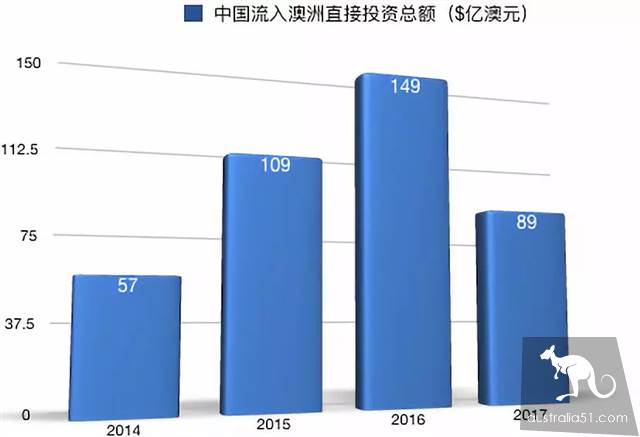
Data collation by reference to the report of the Federal Department of Finance of Australia
In addition to this, Chinese tourists and foreign students have also become Australia's "cash cows":
According to the latest statistics on Australian tourism, the number of Chinese visitors to Australia has reached 1.4 million in the past year, with a total of 10.9 billion Australian dollars spent.
According to the latest White Paper on Chinese students released in January, the total number of Chinese students in Australia has exceeded 190000, second only to the United States. Australia's high cost of studying abroad is even number one among the mainstream destination countries: tuition alone costs $35000 a year (about A $49000).
In other words, these Chinese students earn at least A $9.3 billion a year to Australia, not counting other expenses such as accommodation, transportation, life and so on.
The most disturbing thing is, obviously spent money, but did not buy "happy".
Two, next Detroit? "500000" Africans floating in Guangzhou
According to the economic and the Social Council of the United Nations, the number of foreigners living in China has been rising over the past 25 years. As of 2015, nearly 980000 foreigners have lived in China, of whom nearly 1/5 are from South Korea and Brazil. The Philippines followed suit.
Guangdong, as a coastal city in China, has gradually formed a trading circle since taking a ride to reform and opening up, attracting many foreign businessmen, including Africans.

In 2010, Dr Adams Bodomo of the University of Hong Kong found in a survey that up to 96 percent of blacks living in Guangzhou were engaged in the import and export of goods and wholesale and retail trade in Central Africa. This is actually the most direct reason why blacks are gathered in Guangzhou-they come here to do business.
But with regard to how many African people there are in Guangzhou, there have always been many different statistics on the Internet:
"with a population of 500000," at least two of the 100 Guangzhou people are black, and Guangzhou is full of black brothers. "90% of the Africans in Guangzhou are illegally stranded, and 1 / 10 of them are Chinese in their wives or girlfriends. About 200 African-Chinese hybrids are born every year ".
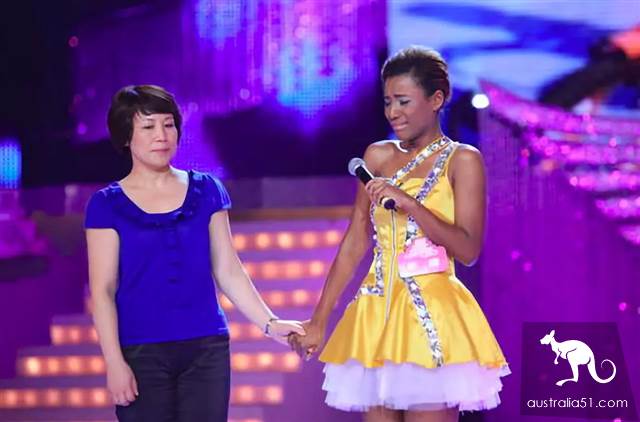
Lou Jing and Mother (left) / Source: < refueling Oriental Angels >, the controversial "Sino-African mixed beauty" on TV program
Although the number of foreigners living in Guangzhou is 118000, according to official figures, there are only 16000 Africans living in Guangzhou, with the majority of foreigners from Europe and America, Japan and South Korea.
However, it is generally believed that the official only accounts for the legal resident population, there is a serious underestimation; In addition to some Africans entering China legally, more than three non-persons (illegal entry, illegal residence, illegal employment).
According to Huang Shiding, a researcher at the Guangzhou Institute of Social Sciences, only more than 2000 Africans live legally in Guangzhou.
According to official statistics, the number of Africans in Guangzhou has increased by 30% to 40% a year since 2003, according to a report published by Guangzhou Daily in December 2007. According to reports, the total number of Africans living legally or illegally in Guangzhou is as high as 300000, or even 500000.
At the same time, the group has been the subject of controversy.
"Negroes have a lower IQ than orangutans and are lazy to eat."
"Negroes have a tendency to violence, burn and loot, and do whatever they want."
"Negroes are promiscuous with take drugs and carry HIV / AIDS, specifically targeting Chinese women. China-Africa union will inevitably lead to threat Huaxia, resulting in the subjugation of the country."
Almost all of these articles often yield 100000 readings in a very short period of time, as well as a lot of reprimand and abuse of the group in the comment section.
But is it true?
An official report from the Guangdong Provincial Public Security Department may explain the answer – all foreign populations, including African countries, have a crime rate of 1.65% in Guangzhou.
The vast majority of the rest, however, are rightly drawn into the circle of prejudice.
Kuthman, from South Africa, says she first felt discriminated against in the subway. By chance, she said, no one else would like to sit next to her, no matter how crowded the subway was.
"when this happened for the first time, I thought it was the person's choice. And then something like that happened, and I started to know what it was."
Akon, from Ghana, said a friend had posted his video to Chinese social networking sites and had received a lot of negative comments. "I don't even want to read," he said. "those hate messages."
Some friends told him that many Chinese people love African basketball star Kobe (Kobe Bryant), but don't like "black", which puzzles him.
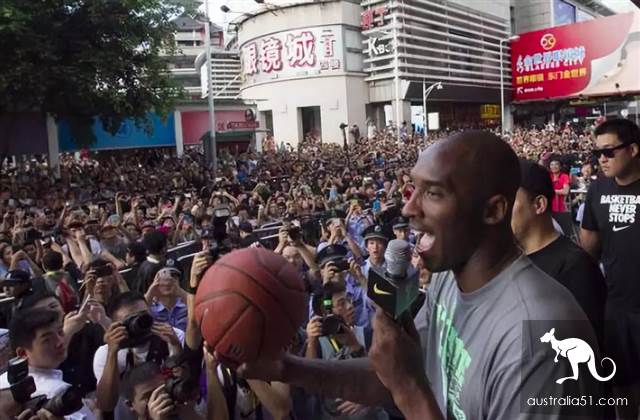
Kobe Bryant / Source: Bleacher Report in China
Some people abroad have been discriminated against because of their Chinese identity and language, while others are interested in giving likes to "non-ethnic groups, although they are far from reproachable."
Both in Australia and in China, many forms of discrimination were originally rooted in ignorance and fear.
Ignorance is like an Australian who once asked me, "in China, does everyone eat their own pets?"
Fear, fear of their own interests by other people threat and even deprive: "because the Chinese are high house prices in Australia, seizing Australia's labour market, so that Australians have no homes to live, no jobs to do."
3. On the chain of discrimination, no one can survive.
In fact, in addition to racial discrimination, there are also household discrimination, gender discrimination, disability discrimination, professional discrimination, high-income discrimination, low-income discrimination, married discrimination against unmarried, heterosexual discrimination homosexual love, European tour discrimination in Southeast Asia.
In short, the Chinese discrimination chain system is so complete that few "survive".
Everyone, no matter which position in a chain of discrimination, can always find a reason to stand on the high ground to achieve discrimination against another person or group.
In Mr. Lu Xun's "the True Story of Ah Q", there is a wonderful clip:
"how can you use your hands and feet?" Said the nun, blushing, as she hurried away.
The people in the hotel laughed. When Q saw that his honours had been appreciated, he became more and more exultant:
"I can't move the monk?" He twisted Yi's cheek.
The people in the hotel are laughing. AQ is more complacent, and in order to satisfy the appreciation of the family, and then a hard turn, let go.
This battle, he had forgotten Wang Hu, also forgot the fake foreign devils, seems to have avenged against all today's "bad luck"; and strange, as if the whole body than the clap after the sound of ease, fluttering seems to fly away.
We can't say that everyone is a Q, but everyone may have had a spiritual victory in the "A Q Spirit" moment.
A Q may be just a Q in feudal times, but in modern society, he may be a "keystroke" in order to continue to carry forward the "spiritual victory law".